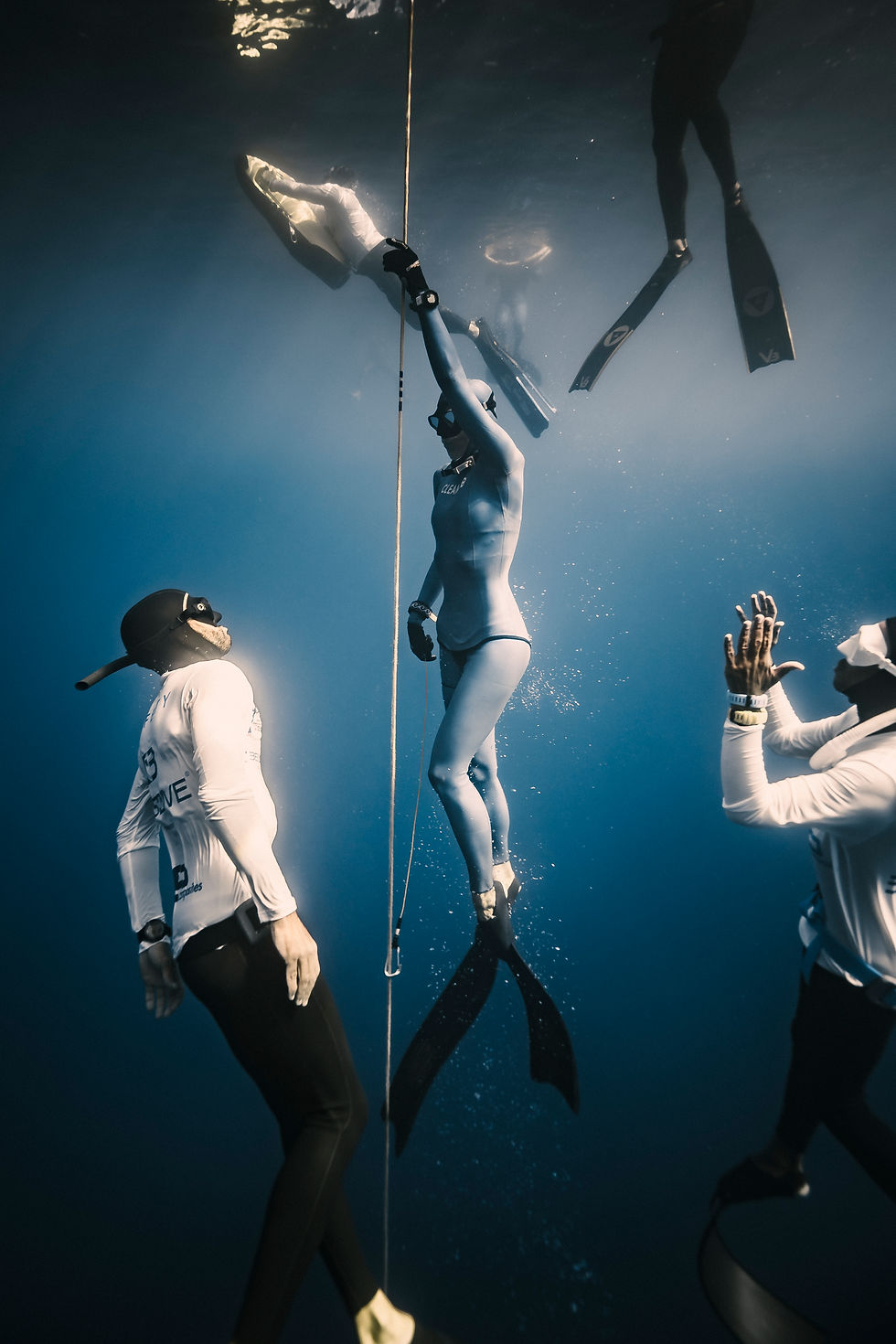It’s not over until it’s over
- Anna-Karina Schmitt
- Mar 23, 2025
- 4 min read
I held my breath for 5 minutes, though it felt like much more! That dive brought me first place in the static discipline at this years Swiss Pool Indoor Championship. Thanks to some great training sessions, the weeks before, I know I’m capable of more. But just knowing that doesn’t help. Of course, it’s an important part of success in a competition — feeding the unconscious mind with good practice and building a self-image, that gives confidence and creates "hungriness" instead of fear.

During the static, I felt my heartbeat for so long—fully aware that this is far from ideal, that the competition excitement had taken over just a bit too much. My O₂ was getting eaten up by the circumstances, and there wasn’t much I could do. So, I decided to enjoy as much as possible of the contraction free part of the dive feeling the weightlessness, the silence, the safety of being surrounded by people with good energy and intentions.
Afterwards I am counting the contractions and try to relax as much as possible between them. On my usual count, after 25 contractions I realised, the dive felt much more tough then it normally does. Time really is that relative, static is a great teacher for that. So I came up..
The other part, that would improve the excitement of things, is to gain more experience in competing. But there is only this one pool championship I attend, so I need to live with that I guess. Every year is getting better though. Small progress is also progress! My trainer is telling me "competition nerves are tricky, you just need to stop caring 😅" yes that makes a lot of sense, I also know from experience and I truly thought I do not care much about it. But the moment the official countdown went on, something changed.
Ending the dive: I surfaced with a samba (later on I thought a samba really only at 5 min? This is how competition nerves leading to less relaxation can mess up your performance, this is why people black-out at competitions so much more often, some only then, because this effect is too often not being calculated or even felt by athletes) but managed to complete the protocol. The judge initially misjudged and gave me a red card. I was disappointed. 5 minutes may maybe not sound like a bad performance, but based on my training, I knew I was capable of more. And with a red card on top of it? That really hurt!
Like every championship, it’s not over until it’s over.

About an hour later, the judge found me with good news: A white card after all. Relief. The magic happens in those unpredictable moments.
Since December, I’ve been dealing with an inflamed upper ankle joint slowly improving but still limiting. I had to cut back on training intensity and volume, and at the same time, I was facing an intense period at work, with extra hours on weekends. Physically and mentally, I wasn’t in the place to play around much with testing my limits, like I would usually do now and then before competitions, just to see where I am at. Instead I was playing safe and gentle. And yet, I still had some beautiful long dives during my training. So I thought—sweet. This is where consistency in practice picks up. Maybe I should give it a try and also compete with the fin anyway. For training this year I set myself the goal to reach 200 meters in the pool—not necessarily in competition, since I only aim for one pool comp a year.
I decided not to compete in the second discipline just moments after receiving the red card—a choice made out of respect for both my health and mindset at that moment. I really feel a bit incomplete now looking back, not trying to do the second dive that day, especially since that decision may have cost me the overall title.

But on the other hand, I had an amazing time with the other athletes, celebrating their successes helping a friend by lending her my wetsuit and weights so she could enjoy a dive without fins. And as the day went on, I felt my energy return. Instead of focusing on myself, I was able to shift that focus to our community. Most of all, I’m grateful for the experience. Looking back at the past few years of training and competing, I feel a sense of peace within me. Competitions teach you so much in such a short time—especially when things don’t go as planned (and they never do!!). I encourage everyone step out of the comfort zone from time to time, join a competition or set yourself goals of things you love doing that you are admiring!
Always Remember: Competitions are trainings in themselves. Like with everything, we only improve by doing more of them, by gaining experience. So don’t get frustrated in your first competitions! In the end, we only compete against ourselves. And don’t get me wrong—a performance is valuable outside of competition. Sometimes, we need to compete just to realize that. The real value in your actions comes from you, how you are feeling it and enjoying it.



Comments